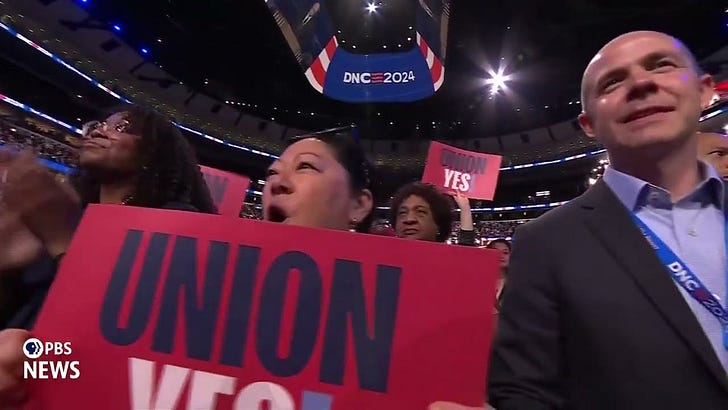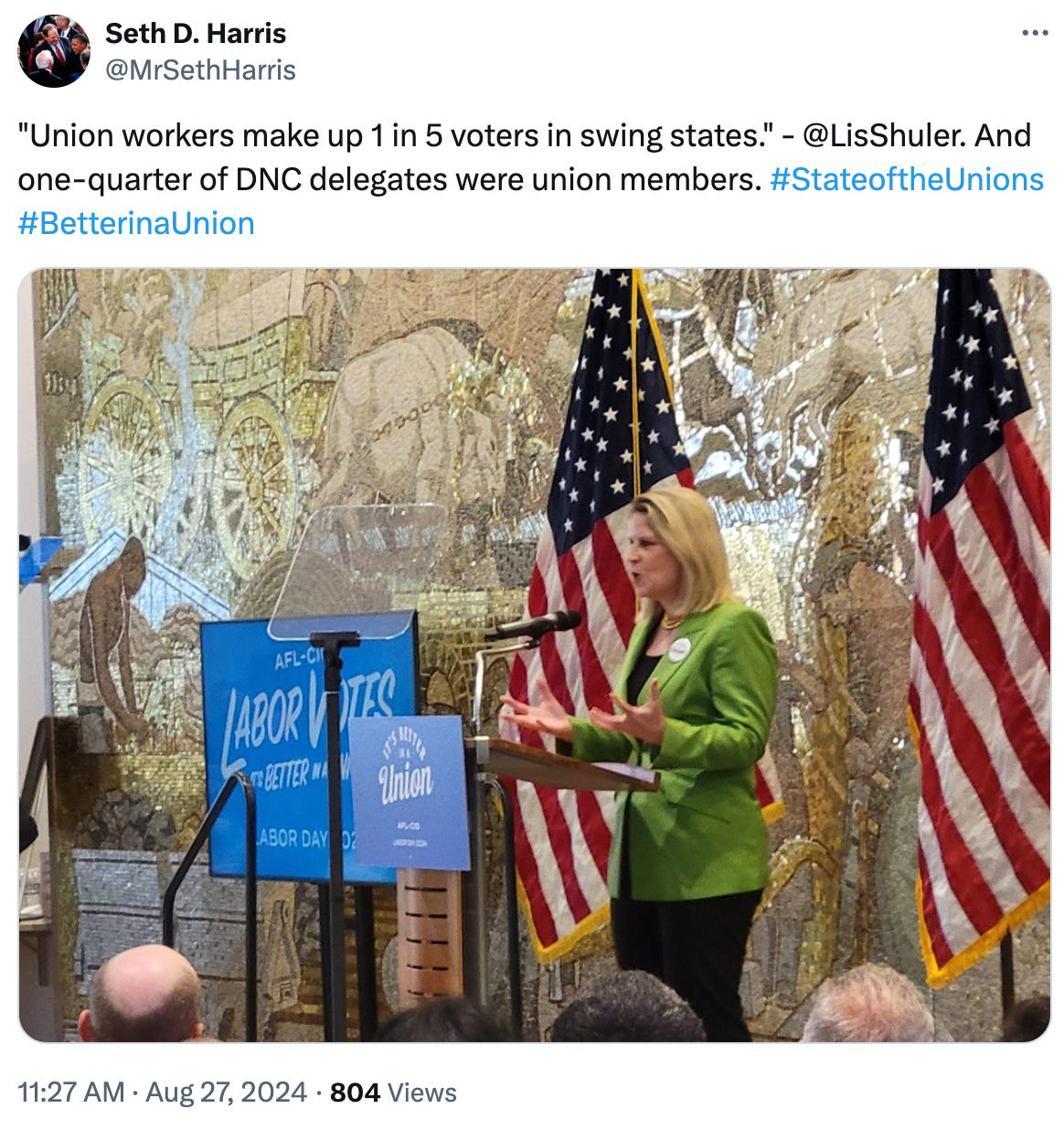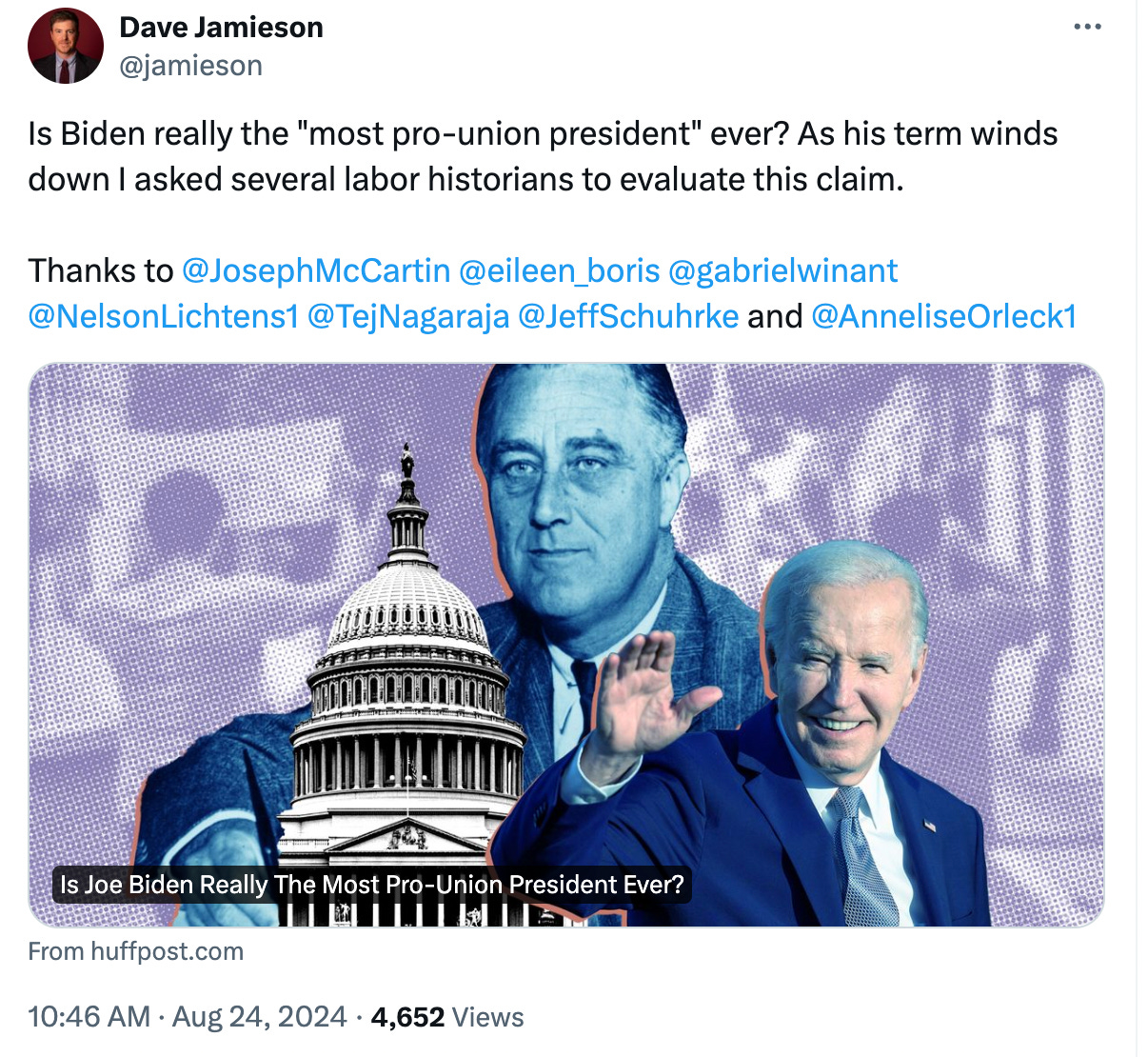The Bleating Yelp
We're being bombarded with messaging about union strength, but it's actually weakness that underpins the push for more freelance busting.
I sound my barbaric yawp over the roofs of the world.
You have to give it up for Walt Whitman. The Bard of Democracy. A masterful poet.
It takes a serious genius to think about which words might best describe a primal cry from the core of the human soul, and then come up with barbaric yawp.
Damn, that guy could write.
You may remember the line about the barbaric yawp from the 1989 film Dead Poets Society. There’s a great scene in which Robin Williams is trying to get his student, played by Ethan Hawke, to find words to describe that thing—that visceral, all-consuming thing—that’s eating away at the kid from the inside. Williams coaxes the shy boy to let go of his fears, to get in touch with his feelings, to name and wrestle with and fitfully spit out this demon from his soul.
This is a barbaric yawp. It’s primal. It’s a show of the individual’s strength.
As I watched the Democratic National Convention last month, and then the social-media display about union popularity over the Labor Day weekend, it seemed to me that the freelance-busting brigade wants us to believe they’re sounding a barbaric yawp.
The messaging was incessant: People love unions! Everyone thinks we’re the best!
With soaring oratory at the DNC, union leaders stood on stage and demanded that—in a nation where every employee already has the freedom to join a union—everyone must be given the “freedom to join a union”:
Then, we were told throughout the Labor Day weekend—in a nation where approval of labor unions is about the same as the past couple years—that support for unions is at an all-time high:
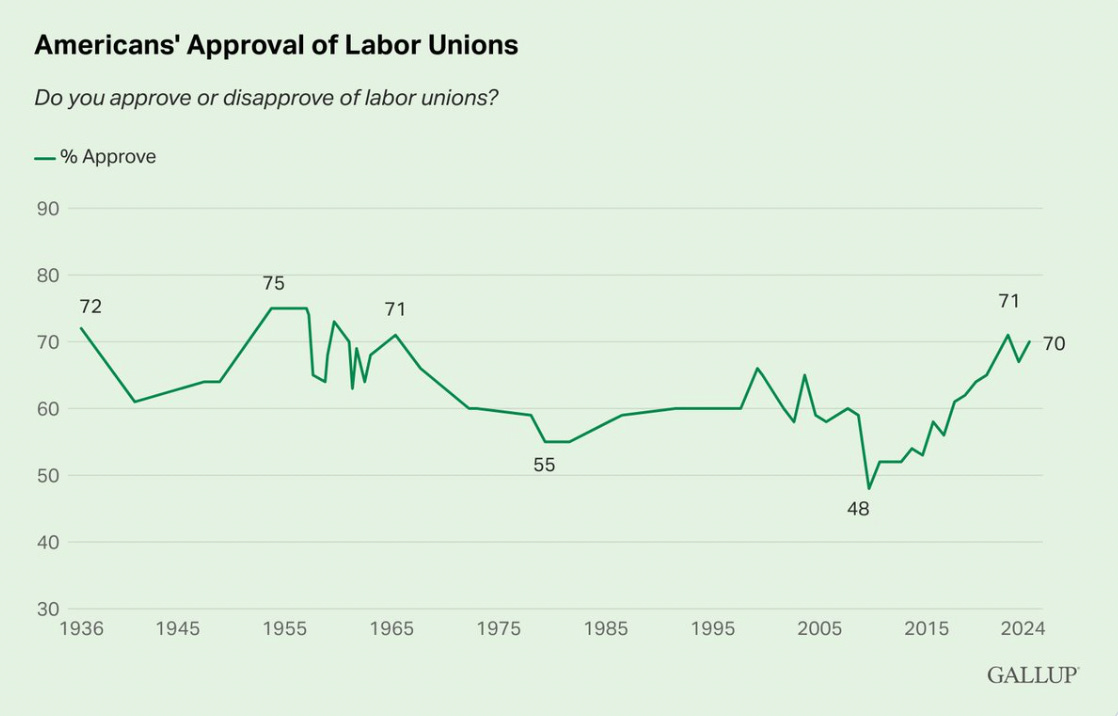
Union leaders like AFL-CIO President Liz Shuler acted as if they’re running the table not only on deciding the Democratic Party’s nominees, but also on swinging the upcoming election:
Now, there’s no denying that union leaders have gotten themselves into a position of political strength within the Democratic Party. Big time. They had a major influence on their “union brother” Tim Walz becoming Kamala Harris’ running mate, and the Democratic Party’s platform promises to “prioritize passing the PRO Act”—the signature freelance-busting legislation that union leaders want to slow the rise of self-employment and create more unionizable jobs.
It all looks like a display of great strength.
But behind the big show, union leaders have deep concern about their own future. They’re facing all-time-low membership numbers in their ranks. As Timothy Noah wrote yesterday in The New Republic:
“Occasionally you’ll see somebody argue that organized labor is regaining strength, but the evidence is always anecdotal. Final word must go to the Bureau of Labor Statistics’ annual report on union membership, which is perennially, relentlessly, dismal. Union density (i.e., the percentage of jobs covered by a union contract) is today half of what it was when those ‘labor is dead’ commentaries started appearing in the early 1980s. In the private sector, union density is six percent, down from its historic peak of 34 percent at the end of World War II. Excepting a tiny bump here or there, union density has tumbled steadily downward since the 1950s.”
In other words, what we’re witnessing is not, in fact, a barbaric yawp.
It’s a bleating yelp.
And it’s actually what makes the freelance-busting brigade so dangerous to all the rest of us right now.
‘Not Interested’
The big problem that unions face has been clear for years. Along with its annual finding about most Americans supporting labor unions, Gallup also routinely finds that most Americans have no interest in actually joining one:
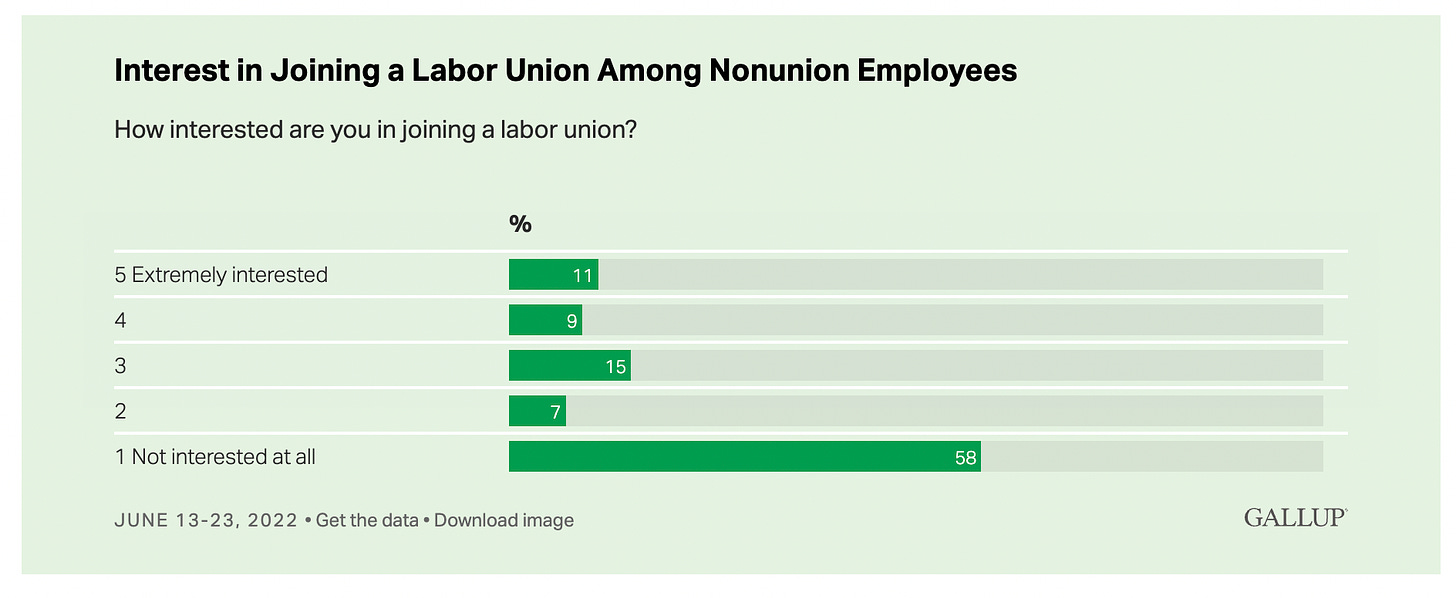
Look at the size of that line at the bottom, next to “not interested in all.”
The display of solidarity at the DNC was not even representative of the unions’ own memberships. Rank-and-file members of the United Auto Workers are campaigning for former President Trump. Sean O’Brien just became the first-ever Teamster to address the Republican National Convention. According to Pew Research, about 40% of union members are, or lean, Republican.
But instead of evolving to match the times—including coming to terms with the fact that an increasing number of people wish to be self-employed—union leaders have placed their bets on politicians. They’re spending hundreds of millions of dollars (at least) on this year’s campaign with the hope that lawmakers will materialize new members for them.
Independent contractors just lived through a similar desperation move at the state level, and it was a disaster. In 2019, union-backed California Governor Gavin Newsom signed Assembly Bill 5, which was sponsored by an assemblywoman who was also a card-carrying Teamster. Newsom promised that this freelance-busting law would help create pathways for more people to join unions.
Instead, AB5 crushed independent contractors and sank overall employment—while California union membership hardly budged at all.
That law was an epic failure because most people do not want to join unions. Independent contractors in other states, including me in New Jersey, rose up to stop copycat bills from passing and tanking our freelance careers, too.
And yet, here we are just a handful of years later, hearing Vice President Harris promise that if we send her to the Oval Office, she will take California-style freelance busting nationwide via the PRO Act—while making it sound as if she’s protecting unions instead of threatening independent contractors:
This is how it feels when people put on a great show of sounding a barbaric yawp.
The reason it’s so dangerous is that it’s actually a bleating yelp from a place of desperation.
‘A Kluge of Threadbare Cliches’
I was reminded about just how reliant union leaders are on politicians (and vice versa) after I saw this tweet from HuffPost’s labor reporter a little more than a week ago:
The responses the writer received from several of those historians amounted to, “Well, um...”
Some said it more poetically than others:
“The sentiment is there, but that is not enough to revive the union movement or allow us to call Biden the most pro-union president ever.”
“It’s fair to say Biden has made an earnest effort to be the most union-friendly president…”
“[H]is administration was not able to present a coherent alternative vision of American society or the American economy, only a kluge of threadbare cliches and encouraging statistics.”
A kluge (yeah, I had to look it up—I’m no Walt Whitman) is a makeshift solution to a problem. It’s actually an apt word to describe what’s been going on the past few years.
It certainly puts into perspective why the freelance busting against legitimate independent contractors continues to be so relentless.
We have been living through the construction of some serious Rube Goldberg scaffolding—a whole-of-government kluge, if you will—to try and keep the unions, and the campaign support they give almost exclusively to Democrats, from falling all the way down.
HuffPost’s writer accurately reports that the Biden-Harris administration, at the direction of “Union Joe,” did a bunch of stuff to try and help the unions that are credited with getting him and Harris into office:
Biden did stack labor agencies with pro-union appointees;
He was the first president to stand alongside striking workers on a picket line;
He did use taxpayer money to fund what one lawmaker called the largest private pension bailout in U.S. history—solely to benefit the unions at a time when more than 60% of Americans older than 50 are worried about having enough money to retire;
And he did give full-throated support to freelance busting at the state and federal levels, trying to knock down the growing number of independent contractors by reclassifying us as unionizable employees.
Newsflash: If the future of the labor movement depends on government-imposed reclassification of independent contractors into unionizable employee status, then the labor movement has no future.
What happened in California made this clear. Nationwide, 60% of freelancers say no amount of money would get us to take a regular job. And wherever such legislation has actually been introduced or put into law, we have risen up to fight back hard and keep our self-employed status.
And so, the bleating yelp grows louder as union membership continues to tank:
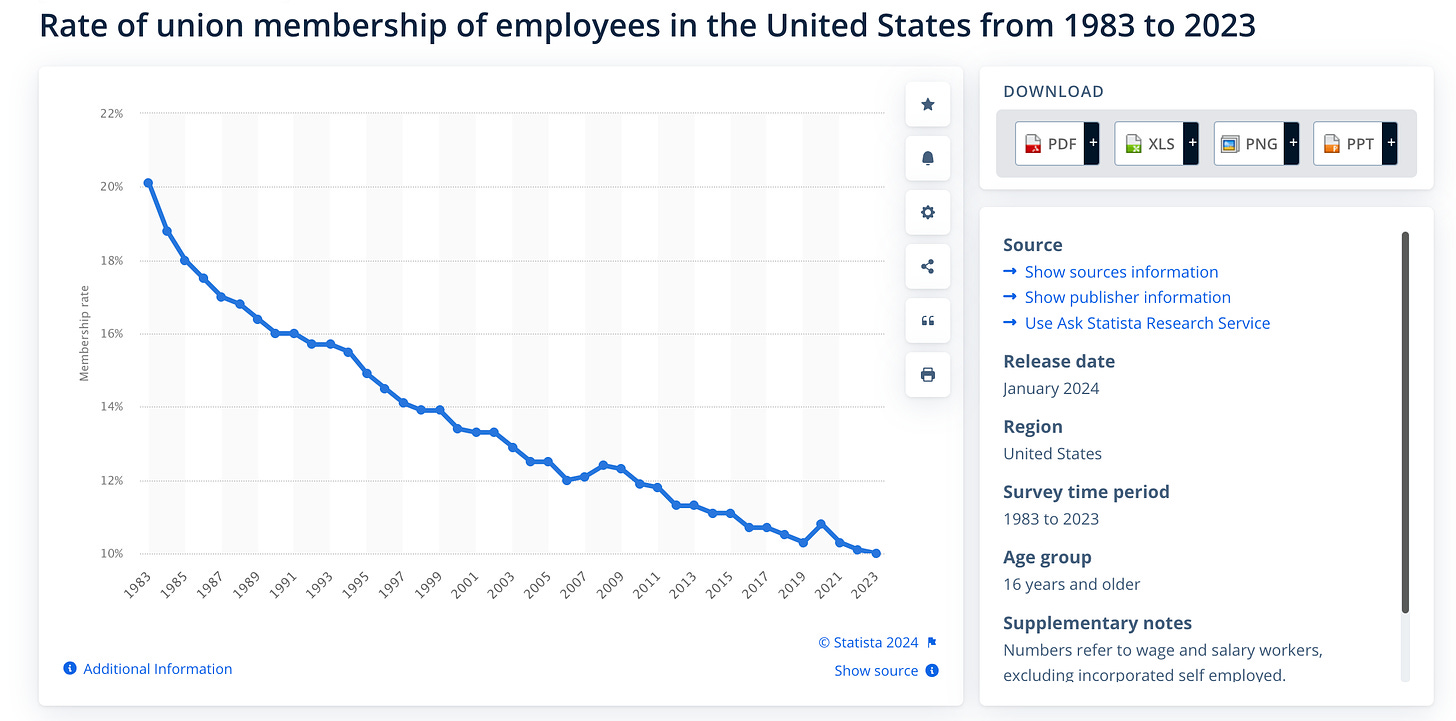
We are not hearing a barbaric yawp coming from a mountaintop.
This bleating yelp may not be coming from a valley of death, but the union leaders sure can smell it from where they’re dangling.
The Danger in Dying
I write a lot of articles for boating magazines. Over the years, I’ve interviewed several rescue swimmers—the heroes who leap out of helicopters and dive into the water to try and save people who are in danger of drowning.
These rescue swimmers have all told me the same thing, again and again:
A person who thinks he might drown will always try to take you down too.
It’s why rescuers are trained to approach from behind, so the panicked person in the water won’t grab them and climb on top of them, drowning them in the process. Laypeople are advised to throw a lifesaving device from a distance while calling for professional help.
When I watch today’s union leaders shouting for yet more freelance busting—and bankrolling the campaigns of politicians who are willing to do the same—I see panic and a fear of drowning. I see them trying to take the rest of us down with them.
Consider what happened off-camera at the Democratic National Convention. A union leader said that if Democrats win this fall, then lawmakers must change the rules of the U.S. Senate—end the filibuster that stops extreme one-sided legislation—to pass the PRO Act. Here’s how Jacobin’s writer reported what happened:
I participated in a roundtable discussion that United Auto Workers president Shawn Fain had with reporters. I asked Fain if he would expect the Senate to get the PRO Act done and to abolish or limit the filibuster if they have to in order to do it.
“I expect the PRO Act to pass for sure,” he said. “As far as the filibuster goes, I don’t know where that goes right now.”
I replied that if the filibuster isn’t broken, the PRO Act cannot pass.
“I would say we hope so, we’d like to see that for sure,” said Fain.
This is the bleating yelp of a panicked swimmer who has already decided it’s fine to take down other people all around him.
Even some of the staunchest union proponents are making clear that decreasing union power is what’s really going on. Chris Bohner wrote a few days ago:
“Of course, labor law reform is vitally important, and it should be labor’s top legislative priority. But if Kamala Harris wins the Presidency, and if Democrats control Congress, Harris will have to overcome a certain filibuster in the Senate and wavering support from ‘moderate’ Democrats facing unified opposition from employers. This is the traditional graveyard for labor law reform, but hopefully, a labor movement riding on a crest of popularity can transform the vibes into a legislative accomplishment.
“The problem, however, is that labor’s legislative strategy has an expiration date. As long as labor’s share of the workforce continues to decline (5.8 million members lost since 1980 and counting), its political power also decreases.”
The reality is this: Only the idea of unions existing is popular right now with Americans.
The idea of joining a union is unpopular—as evidenced by the fact that most Americans don’t wish to do so.
And unions’ political power, as strong as it may seem right now, is in fact limited. Hence the increasing desperation to ratchet up the freelance busting nationwide, while they think they still have a real chance to get it done.
Whitman’s famous line—I sound my barbaric yawp over the roofs of the world—comes from a poem called Song of Myself. A handful of lines later, he writes:
I bequeath myself to the dirt to grow from the grass I love,
If you want me again look for me under your boot-soles.
He’s writing about mortality, and the peace that comes with no longer fearing it.
The lines are all part of his epic work Leaves of Grass, which is about natural cycles of growth, death and rebirth.

